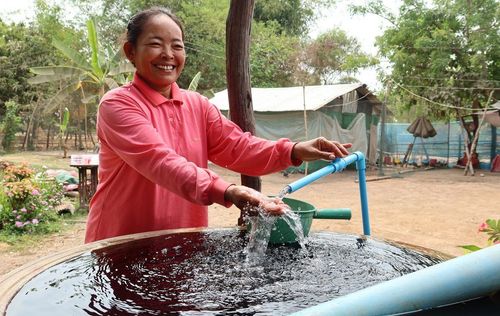Show Notes
World Water Day, recognized yearly on March 22, brings awareness to the 2.2 billion people across the globe without access to clean water. An estimated 842,000 people die each year from diseases caused by unclean water, inadequate sanitation, and poor hygiene habits. Kristy Graham talks with our Samaritan’s Purse staff that implement projects that provide clean water and educate developing communities on health and hygiene practices.
Ken Isaacs, the vice president for programs and government relations, sits down with Kristy to share the ministry’s history and background with water, sanitation and hygiene (WASH) programs. He and Kristy talk about the array of initiatives that Samaritan’s Purse has designed to improve lives around the world through clean water.
“I have seen people’s lives changed because of clean water,” Ken told Kristy. “I’ve also seen the Gospel shared at wells, churches built, and communities of believers come together. The catalyst for them was someone cared enough to come and help them get clean water.”
Daphne Mandhawun, a Samaritan’s Purse project manager in Uganda, has witnessed this first-hand. She tells Kristy over a Zoom call that in the slums of Kampala, the capital city of Uganda, communities are still struggling with open defecation, lack of clean water, and little sanitation education. While the government has installed a few water access-points, each has quickly turned into hubs of trafficking and violent crimes. Samaritan’s Purse is working alongside families in Ugandan communities to offer clean drinking water through tap points at the household level—allowing them to freely get water at their home without paying unattainable fees.
“This has helped them so very much, and helped in the reduction of diseases,” Daphne said. “They now have water which they can use for frequent hand-washing, which is especially [beneficial] because of COVID-19.”
Similar to Uganda, Cambodia also struggles to sustain clean water throughout their rural communities. Barry Jessen, the country director in Cambodia, tells Kristy that the main source of unsafe migration stems from Cambodia’s nine-month dry season. Because of the lack of water, agriculture and farming suffers. This makes jobs hard to find in the majority of the country. Samaritan’s Purse recognized the compounding disaster that was rooted in the lack of clean water and began to drill wells in rural villages.
“We identify the communities that are dry, and we go in and do ground surveys and start drilling wells,” explained Barry. “Once you’ve got water, then immediately you’ve got clean drinking water. Immediately your disease drops down so children don’t miss as many days of school, so education increases. For the first time in these people’s lives, they turn on a tap in their house and water comes out.”
Access to clean water completely transforms lives and communities. Most importantly, this opens the door to share the hope of the Gospel. Please continue to pray for the families that still lack safe water and for the Samaritan’s Purse teams that are coming alongside them to provide clean water and the hope of the Gospel.

This World Water Day, Samaritan’s Purse is recognizing the 2.2 billion people without access to clean water. The ministry is coming alongside communities worldwide to provide sustainable water sources that will impact families for generations to come.
Resources
– Visit our website to learn more about the Samaritan’s Purse projects that provide clean water and promote safe hygiene practices.
– Listen back to our episode, “The Ripple Effect: Operation Christmas Child Shoebox Recipient Gives Back,” or watch his video, to hear Yves’ redemption story: once a boy living in Africa without easy access to water, his life was transformed by the power of the Gospel and a simple shoebox gift.
– Do you want to stay informed about the work of Samaritan’s Purse, prayer alerts, and volunteer opportunities? Sign up to receive our email updates.
 Related Episodes
Related Episodes
 Come and See: Saving Lives through Surgery
Come and See: Saving Lives through Surgery Adoption Awareness Month: Orphan Care and Family Support
Adoption Awareness Month: Orphan Care and Family Support Finding God in the Floorboards: Operation Christmas Child
Finding God in the Floorboards: Operation Christmas Child Making an Eternal Impact: Gifts for Families Around the World
Making an Eternal Impact: Gifts for Families Around the World Sounds of Hope: Operation Christmas Child Shoebox Recipient Gives Back
Sounds of Hope: Operation Christmas Child Shoebox Recipient Gives Back The Ripple Effect: Operation Christmas Child Shoebox Recipient Gives Back
The Ripple Effect: Operation Christmas Child Shoebox Recipient Gives Back A Letter Changed Her Life: Operation Christmas Child Shoebox Recipient Gives Back
A Letter Changed Her Life: Operation Christmas Child Shoebox Recipient Gives Back Meeting Physical and Spiritual Needs in Bolivia
Meeting Physical and Spiritual Needs in Bolivia Operation Christmas Child: COVID-19 Updates
Operation Christmas Child: COVID-19 Updates Processing Centers for Operation Christmas Child
Processing Centers for Operation Christmas Child Operation Christmas Child in Ecuador
Operation Christmas Child in Ecuador A Message from Kristy: Leaning on Christ During Advent
A Message from Kristy: Leaning on Christ During Advent Finding God in the Floorboards
Finding God in the Floorboards Operation Christmas Child: Packing a Gift That Lasts
Operation Christmas Child: Packing a Gift That Lasts Staff Devotions: The God Who Sees
Staff Devotions: The God Who Sees Operation Christmas Child: The Fun of Preparing Shoeboxes for Little Hands and Feet
Operation Christmas Child: The Fun of Preparing Shoeboxes for Little Hands and Feet “It Changed My Life”: Celebrating 200 Million Gospel Opportunities
“It Changed My Life”: Celebrating 200 Million Gospel Opportunities Mission of Hope: Delivering the 200 Millionth Shoebox to Ukraine
Mission of Hope: Delivering the 200 Millionth Shoebox to Ukraine Operation Christmas Child: Global Connect Conference
Operation Christmas Child: Global Connect Conference A Harvest in Cambodia: 20 Years of Ministry
A Harvest in Cambodia: 20 Years of Ministry The Miracles of God and the Power of Forgiveness
The Miracles of God and the Power of Forgiveness Every Tribe and Tongue: Translating Testimonies
Every Tribe and Tongue: Translating Testimonies

